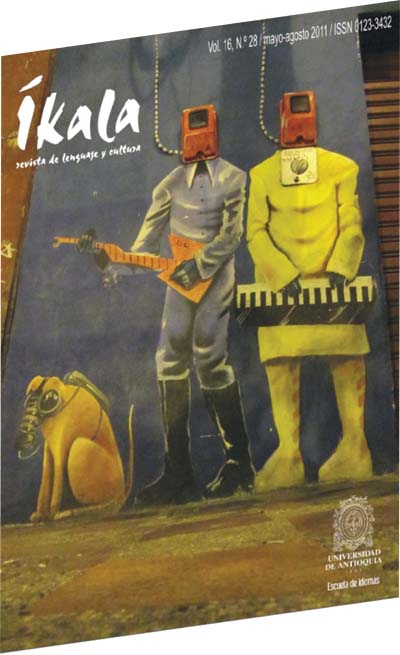The English Reading Strategies of Two Colombian English Preservice Teachers
DOI:
https://doi.org/10.17533/udea.ikala.9910Keywords:
strategies, reading comprehension, metacognition, pre-service teachers.Abstract
This study focuses on the findings of a research project that aimed at identifying the English reading comprehension strategies used by two preservice English teachers, one a successful reader and the other one a less successful reader. The participants were students of a B.Ed. undergraduate program at a public university located in the Colombian Eje Cafetero. Methodological procedures included the collection of reading data through think-aloud protocols, and analysis was based on the constant-comparative method (Glaser & Strauss, 1999).
Findings suggest that three main differences characterized the reading of the two TEFL readers: the number of strategies evoked, the frequency of their use, and the effectiveness of the strategy used by each reader. The article addresses implications for reading instruction and research based on both cases.
Downloads
References
Aguirre-Morales, J. & Ramos-Holguín, B. (2009). Guidance in reading strategies: A first step towards autonomous learning in a semi-distance education program. Profile, 11(1), 41-56.
Anderson, R. C. & Pearson, P. D. (1984). A schema-theoretic view of basic processes in reading comprehension. In Pearson, P. D., Barr, R., Kamil. M. L. y Mosenthal, P. (Eds.), Handbook of reading research. New York: Longman.
Block, E. (1986). The comprehension strategies of second language readers. TESOL Quarterly, 20(3), 463-494.
Cummins, J. (1979a). Cognitive/academic language proficiency, linguistic interdependence, the optimum age question. Working Papers on Bilingualism, 19, 121-129.
Fotovatian, S. & Shokrpour, N. (2007). Comparison of the efficiency of reading comprehension strategies on Iranian university students' comprehension. Journal of College Reading and Learning, 37(2), 47-63.
Gallimore, R. & Goldenberg, C. (1993). Activity settings of early literacy: Home and school factors in children's emergent literacy. In Forman, E. A., Minick, N. & Stone, C. A. (Eds.), Contexts for learning: Sociocultural dynamics in children's development. New York: Oxford University Press.
Gallimore, R. & Tharp, R. (1990). Teaching and mind in society: Teaching, schooling, and literate discourse. In Moll, L. C. (Ed.), Vygotsky and education: Instructional implications and applications of sociohistorical psychology (pp. 175-205). Cambridge, UK: Cambridge University Press.
García, G. E. (1998). Mexican-American bilingual students' metacognitive reading strategies: What's transferred, unique, problematic? In 47th yearbook of the national reading conference (pp. 253-263). Oak Creek, WI: National Reading Conference, Inc.
Glaser, B. G. & Strauss, A. L. (1999). The discovery of grounded theory: Strategies for qualitative research. New York: Aldine de Gruyter.
Goldman, S. R., Reyes, M. & Varnhagen, C. K. (1984). Understanding fables in first and second languages. NABE Journal, 8(2), 35-66.
Handsfield, L. J. & Jiménez, R. T. (2008). Revisiting cognitive strategy instruction in culturally and linguistically diverse classrooms: Cautions and possibilities. Language Arts, 85(6), 450-458.
ICFES. (2006). Análisis resultados 2006. Retrieved January 20th, 2009, from http://www.icfes.gov.co
ICFES. (2010). Porcentaje de estudiantes por niveles de competencia a nivel nacional. Retrieved from http://www.icfesinteractivo.gov.co/resultados/informes/snee_rep_res_est_tmp.jsp
Jiménez, R. T. (1997). The strategic reading abilities and potential of five low-literacy Latina/o readers in middle school. Reading Research Quarterly, 32(3), 224-243.
Jiménez, R. T., García, G. E. & Pearson, P. D. (1995). Three children, two languages, and strategic reading: Case studies of bilingual and monolingual readers. American Educational Research Journal, 32(1), 67-97.
Jiménez, R. T., García, G. E. & Pearson, P. D. (1996). The reading strategies of bilingual Latina/o students who are successful English readers: Opportunities and obstacles. Reading Research Quarterly, 31(1), 2-25.
Kamhi-Stein, L. D. (2003). Reading in two languages: How attitudes toward home language and beliefs about reading affect the behaviors of ''underprepared L2 college readers''. TESOL Quarterly, 37(1), 35-71.
Keene, E. O. (2008). To understand: New horizons in reading comprehension. Portsmouth, NH: Heinemann.
Kohn, M., Landon, R. & Kohnstamm, T. (2006). Colombia (4 ed.). Footscray, Australia: Lonely Planet Publications.
McTavish, M. (2008). ''what were you thinking?'' The use of metacognitive strategies during engagement with reading narrative and informational genres. Canadian Journal of Education, 31(2), 405-431.
Nagy, W. E., García, G. E., Durgunoglu, A. Y. & Hancin-Bhatt, B. J. (1993). Spanish-English bilingual students use of cognates in English reading. Journal of Reading Behavior, 25(3), 241-259.
Poole, A. (2009). The reading strategies used by male and female Colombian university students. Profile, 11(1), 29-40.
Pressley, M., El-Dinary, P. M., Gaskins, I., Schuder, T., Bergman, J. L., Almasi, J. et al. (1992). Beyond direct explanation: Transactional instruction of reading comprehension strategies. The Elementary School Journal, 92(5), 513-555.
Pressley, M. & Hilden, K. (2004). Verbal protocols of reading. In Duke, N. K. & Mallete, M. H. (Eds.), Literacy research methodologies. New York: The Guilford Press.
Rudell, R. B. & Rudell, M. R. (1995). Teaching children to read and write: Becoming an influential teacher. Needham Heights, MA: Allyn & Bacon.
Tracey, D. H. & Morrow, L. M. (2006). Lenses on reading: An introduction to theories and models. New York: The Guilford Press.
Yin, W. M. & Agnes, C. S. C. (2001). Knowledge and use of metacognitive strategies. Retrieved January 12, 2009, from http://www.aare.edu.au/01pap/won01419.htm
Zhang, L. J. (2001). Awareness in reading: EFL students' metacognitive knowledge of reading strategies in an acquisition-poor environment. Language Awareness, 10(4), 268-288.












